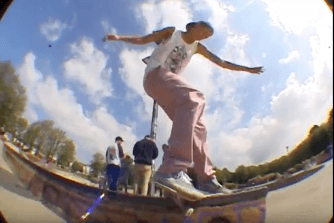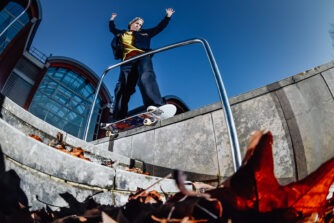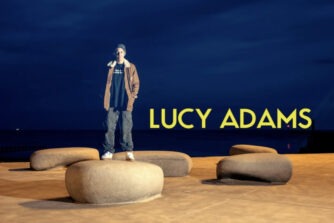To continue celebrating International Women’s Day we have published Lucy Adams’ Issue 22 interview online. Also big congrats to Lucy for being appointed as Chair at the World Skate Continental Skateboarding Commission for Europe! Lucy elaborates more about Skateboard GB in the interview by Guy Jones below!

Lucy Adams ~ Photo by: Andy Pickard
Introduction & Interview by Guy Jones
Portrait by Andy Pickard
Skate Photography by Reece Leung
Lucy is one of those characters that is too productive for the human race. Fresh off of us interviewing her for her incredible documentary by Andy Evans ‘A Metre of Air’, she shot these rad photos whilst working her arse off as a mother, partner, professional skateboarder and member of Skateboard GB, not to mention everything in between. With the Olympics imminent we thought we’d speak to Lucy more about her role at Skateboard GB and how this institution exceeds just a renowned world competition. Lucy, you are an inspiration as always and anyone who puts their foot half as hard on the gas as you do should be proud. The answers in this interview are shared by Lucy’s rad colleagues at Skateboard GB, Chris Lawton and Neil Ellis.
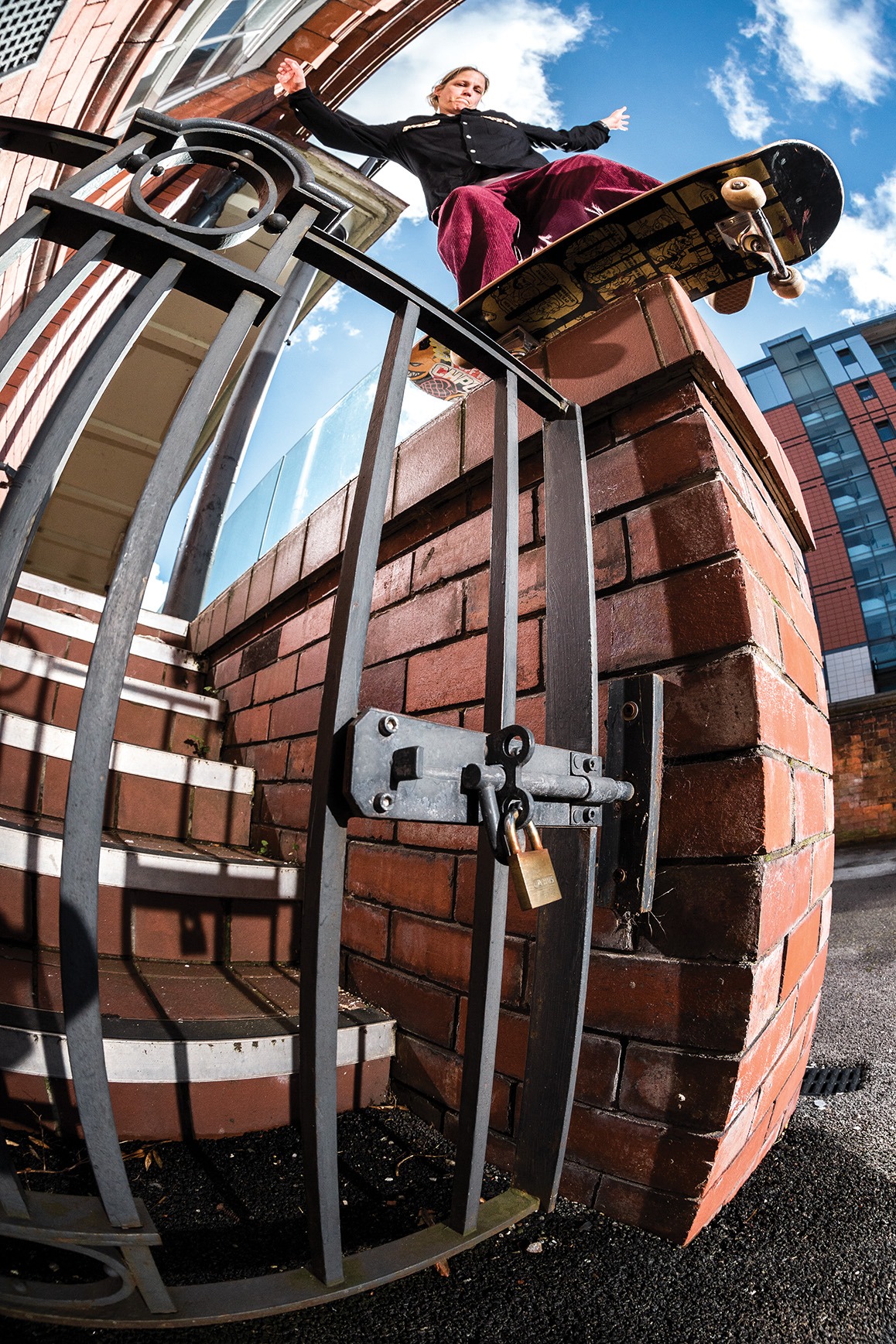
Lucy Adams – Ride on 50-50 ~ Photo by: Reece Leung
Firstly Lucy thank you so much for doing this, as a firm purveyor of things your schedule is always jam packed and ever expanding! One thing that is coming to fruition is that the Olympics are happening, if not now at the point of print. Is it quite surreal it’s actually here and how similar do you feel the UK skate team is to the story of the iconic film Cool Runnings?
Hahaha. As always thanks for your support for me and the womens’ and girls’ skateboarding scene across the UK, the last issue had multiple women featured and it’s a really welcome change to open the pages of a skateboarding print mag and see that.
As for the UK skate team, and Cool Runnings, it was actually quite a way off! There was no exact science to it because ‘skateboarding’ obviously, but in order to get the funding to afford to send some Brits abroad and give it a bash, we had to justify it some way. We looked at who was out there competing across the world already, getting some results and getting that experience with other good skaters, as well as the type of tricks that they were doing. With comps there are obviously certain elements that judges score on, big stunts and good flow, and so we looked at the pool of British skateboarders able to do those two things and that was where Sam Beckett, Alex Decunha, Alex Hallford, Sky Brown and Jordan Thackeray came from. Add in Derby Daz as a John Candy-esque coach… I jest, but yeah we also bid for someone to act as that TM, mentor figure.
Since its inception Skateboard GB has progressed and changed a lot with the addition of a lot more roles, could you briefly describe its journey up until this point?
What began as a Board of Directors and a partially funded CEO in 2015, with myself as voluntary Chair, has become an organisation that now has five skateboarders as employees all working hard to support British Skateboarding. Those first five years featured a lot of leg work, establishing ourselves in the worlds of Sport England and UK Sport, learning and exploring how we best work for the skateboard community. One hard thing was using the words ‘National Governing Body’, there’s so much to unpack around that very label. We never wanted to be like a traditional NGB that’s very dictatorial and structured in its operations, but in order to qualify for the support and investment from government agencies there was a balancing act. Shout out to James Hope-Gill for leading and the Board Members for assisting us to getting our house in order so that we could demonstrate that we were a safe pair of hands for investment, because now we have a team of staff that can spend a full working week getting their hands dirty and getting on with jobs that will do more to help skateboarding on these shores.
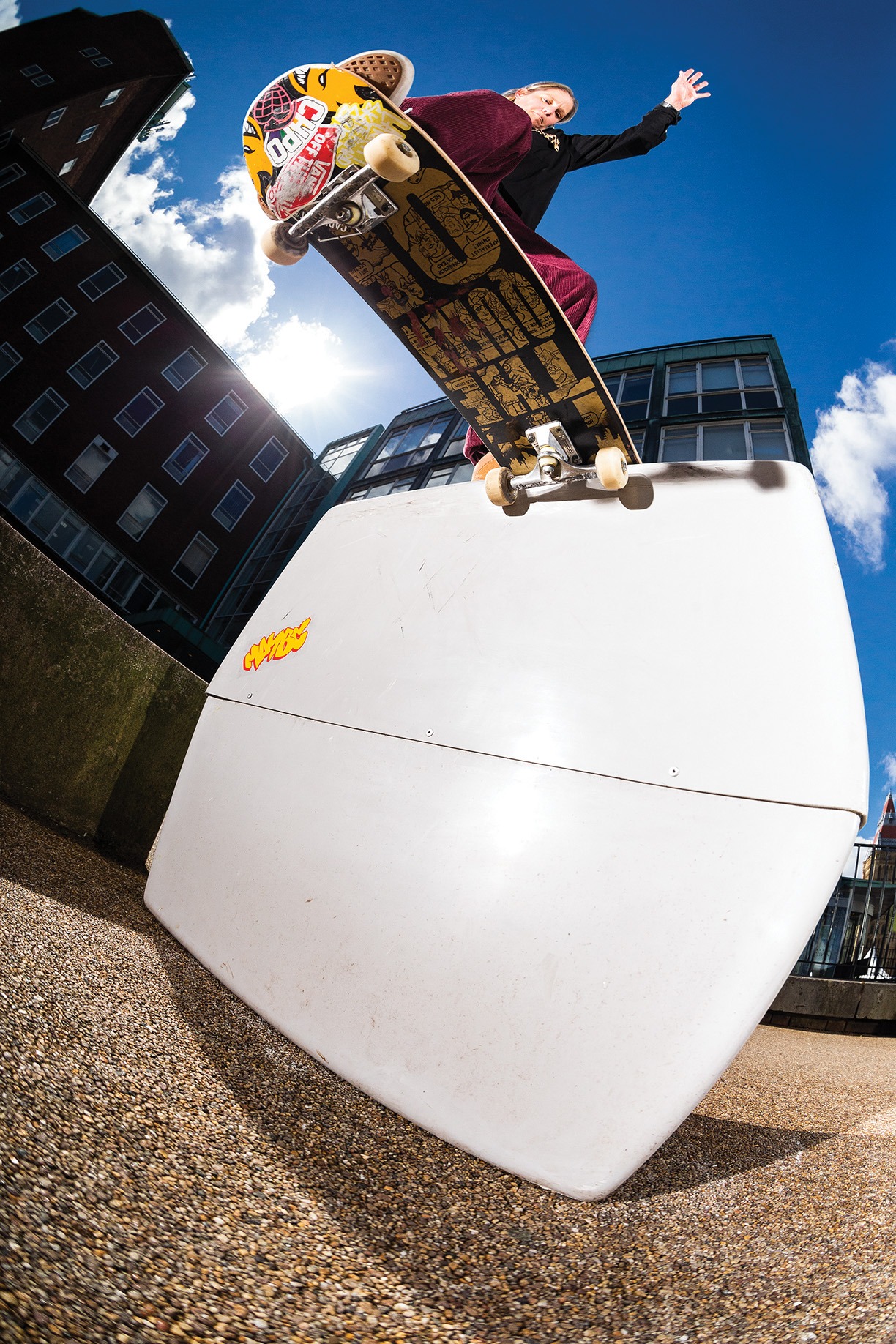
Lucy Adams – Noseslide ~ Photo by: Reece Leung
Despite the Olympics being heavily associated, Skateboard GB exceeds far more than this infamous competition and actually has a huge impact on grass roots skateboarding. Could you describe some aspects of the roles yourself and Chris Lawton do?
One of the biggies is supporting skatepark projects; we’ve given project assistance to over 200 in the form of a letter of support, pointing towards potential funding streams, how to form a user group, social media promotion etc. This has been no one’s official role but something that has been heavily led by Neil and Ricardo and it’s an endless and a lot of the time quite thankless task. Respect to them for keeping up the fight. We’ve also produced a Facilities Guide (more on that below) for councils and users to help better facilities get built, something we can all benefit from!
Another large element is looking at ways to support those that want to teach or coach skateboarding. There’s a huge workforce up and down the country that are delivering ‘learn to skate’ sessions and doing a great job, we want to offer support for them.
Lately, something we’re very proud of is creating a skatepark refurbishment project partnering with VIY (Volunteer It Yourself), which combines volunteering and DIY by challenging young people aged 14-24 to learn trade and building skills, on the job, by committing to help fix local youth and community facilities in need of essential repairs or improvement.
Chris Lawton came on board with SBGB this year and his role covers the Skateable Spaces programme plus some work that complements coach development and support for talented skaters. This programme tries to identify interesting, important local projects that could genuinely benefit from our help and then show other crews and local areas ‘how to’ build, protect or develop their spot. It’s not about formal skateparks, but those spaces that merge all sorts of cool things and have loads of potential to transform cities more widely.
My role involves me looking at ways to support our good skaters that means they can spend more time doing what they love and what they thrive at. We can invest the money we have been awarded into our parks, people and skaters. We can lobby for a better standard of facilities, we need more people supporting events, so we could help educate more people to be good judges, MCs, event organisers, and bring our people with us! We also need to help good skaters with the opportunities to compete and travel.
Can you elaborate more on the commonly less acknowledged radness that Skateboard GB provides in regards to supporting communities and acquiring funding?
So funding is a challenge in the UK, as anyone working at the grassroots will know. There are local and national grants available, but they can have annoying strings and constraints that often work against what we know is best as skaters. Then resources for time and labour are really hard to come by, which is why skate organisations are often voluntary or at least very, very low pay. Finally you need to know loads of dull stuff, like how to incorporate an organisation legally, how to do your accounts, how to communicate with councils and how to keep funders happy.
What we do is work really closely with the community groups, advise them on the kind of organisation that might work for them, help with funding and writing applications, and encouraging organisations to collaborate. Then we can then link in newer organisations to this community of mutual aid and assistance and share stuff, like successful examples of funding applications, or research that demonstrates positive impacts on mental health, so it isn’t quite as lonely for each community to be fighting their fight on their patch, and so we can all grow together and make the national scene and its physical spaces really rad, inclusive and sustainable.
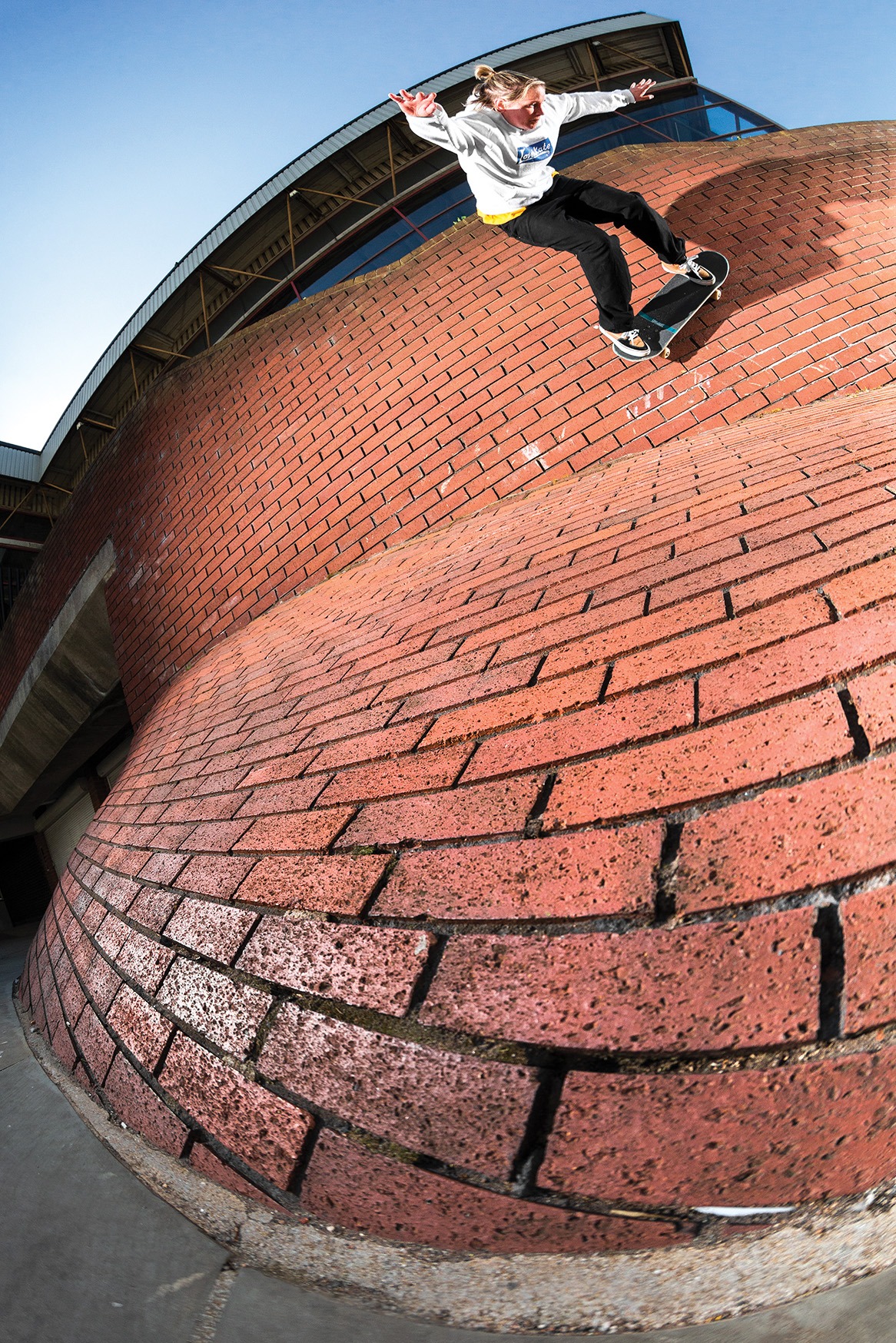
Lucy Adams – Wallride ~ Photo by: Reece Leung
In regards to public space and public opinion, what steps are Skateboard GB taking? And from your perspective as somebody who has seen the range of awful to incredible skateparks, as well as often unjust anger towards the useless wooden toy, what would you like to see in terms of improvement?
A lot of it is really frustrating – that perception that it’s some anti-social activity is very much still there. There is also a history of bad investments in public amenities, not just in skateboarding. These things are interlinked; if local authorities think skaters are antisocial idiots and they already under-invest in their outdoor spaces, or have over-cozy relationships with cowboy contractors, or have been absolutely hammered by national budget cuts, then skateparks are going to be even worse than other amenities. Bad skateparks don’t happen in a vacuum.
We are seeing the tide turning a bit, but the legacy of that earlier period can be seen all over the country both in crap skateparks and also the persistent anti-skate Bylaws and lingering PSPOs.
A big piece of SBGB work was producing a Skatepark Design and Development Guidance, which Iain Borden helped steer and was co-branded with Sport England and sent out to every council in the country. Councils are coming to us directly much more, already with a plan in their minds and already wanting to work with skatepark users. If a local council is resistant, the skaters have a really rigorous resource that’s been written by skaters and skatepark builders and co-signed by the CEO of Sport England. With the current generation of brilliant skatepark design and construction companies, who can also do a lot of the legwork for councils in terms of both consultation and also helping communities with fundraising, there isn’t really any excuse to build bad skateparks anymore. I suppose the next bit is starting to work more to improve how we can use public / shared space like other nations e.g. Sweden with Malmo, Australia with Melbourne.
In regards to communities and raising awareness about how beneficial to public space skateboarding is, how have various councils’ approaches changed or developed since you’ve been a part of Skateboard GB?
Well as mentioned above the Facilities Document has influenced councils into finding better ways of working, but also since the Pandemic hit we were really engaged with by local authorities in supporting them with guidance. We’ve also seen the whole Olympic Sport element giving it credibility, seeing the size and scope of the facility in Tokyo has opened some eyes and some councils are definitely talking more about larger investment to build bigger parks. We all know that skateboarders are still getting chased out of some town centres but, at the level of policy and rhetoric, municipalities are increasingly looking at ways to include skaters in public spaces rather than exclude them. The Long Live Southbank, Malmö, Bordeaux and Tampere crews all deserve a lot of credit here, along with the wider Pushing Boarders conferences and all the academic work, documentaries and TED-talk style lectures.
Our language and strategies have changed as skateboarders too, so we look to Malmö or Tampere, and we say “include us in your urban development plan, and we’ll be ‘eyes on the street’ that enable ‘healthy street life’”. To quote Jane Jacobs, the grandmother of urban development, this basically means you have a secure, friendly public space because skaters are around all the time; discouraging any theft, assaults or other proper crime. Of course there is a dark side to all this, like Ocean Howell’s fear that skaters could be manoeuvered into being unwitting ‘shock troops of gentrification – they help make an area look cool, the developers move in, and then the original residents and the skaters are displaced. Which comes back to why the stuff we’re doing at a local level with Skateboard GB is so important. If we can steadily build up capacity and capability amongst all these amazing skater-led organisations, they can work with us and each other to keep making good decisions, ensuring that we’re not duped into doing something that either negatively affects more vulnerable people or has negative implications for another place.
I have to say a huge thank you to my colleagues Neil and Chris for their support in answering these questions. Chris has an exceptional way with words and a lot of the above are his words passed on via me, he is incredibly passionate about what he does and is a pleasure to work with! Big up to the team at SBGB.



